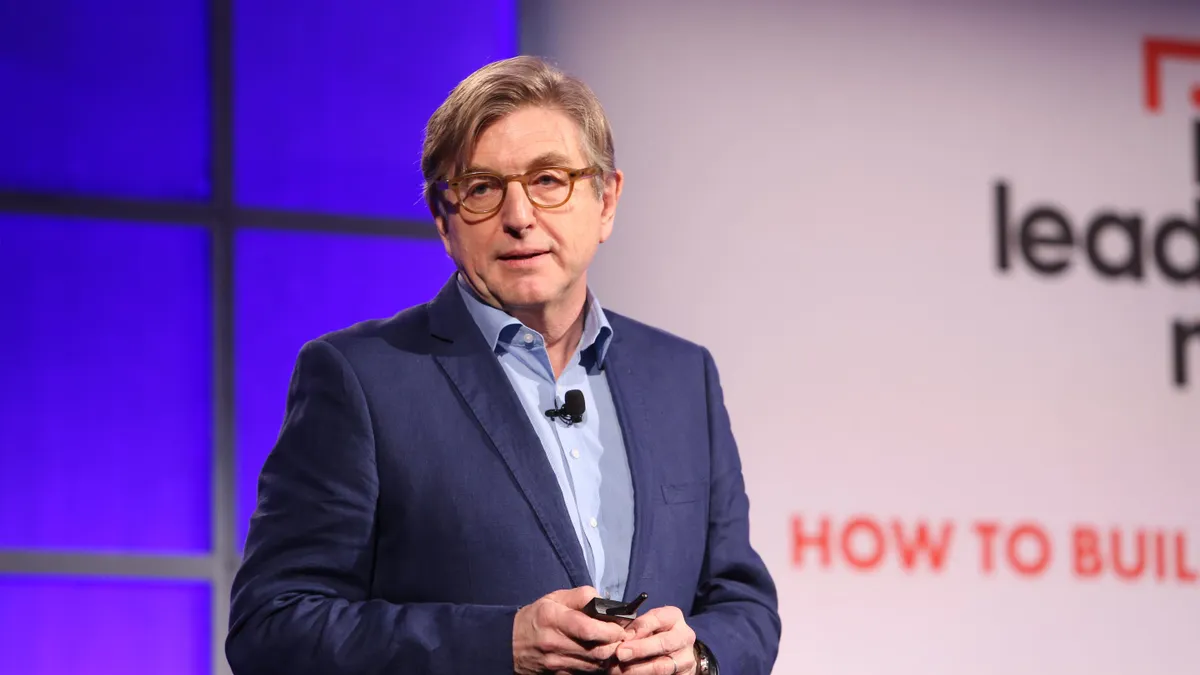PALM DESERT, CA — Contrary to multiple reports that Unilever CMO Keith Weed would take a harder line on Facebook and Google in his address at the IAB's Annual Leadership Meeting on Monday, the executive instead encouraged deeper collaboration with the digital platforms often cited as exacerbating gaps in digital media transparency. Marketers need to stop thinking about problems like brand safety as they pertain to their businesses and instead examine these issues as they increasingly harm society as a whole, Weed insisted. Such an approach requires stronger partnerships.
"In this swamp which is the digital supply chain, we need to think very differently about something which has been an internal industry concern," Weed told an audience of marketers, publishers, vendors and more. "This is no longer an internal industry concern. We have mainstream consumer coverage, and as an industry, we seem to be sleepwalking on progress, on things which are fundamentally hygiene factors."
Part of the solution
A large portion of Weed's talk centered on the degradation of consumer trust in digital media and with brands. While the executive did not hold back in his criticisms of companies like Google or Facebook for the role they've played in spreading division, his approach to dealing with them in 2018 was less fiery than attendees might've expected.
"I'm not interested in giving ultimatums and stamping my foot. I very much believe we all need to be part of the solution,” Weed said, possibly taking a swipe at P&G's Marc Pritchard, who, at the same conference last year, made considerable waves after issuing a call to action for the company's digital ad partners to achieve third-party accreditation by the end of 2017 or else risk losing its business.
Portions of Weed's prepared remarks released early and reported on earlier this week underscored how Unilever is considering pulling back investments in digital platforms if they don't meet its standards for brand safety. Much of the media chatter leading up to the talk stemmed from a presentation slide that Weed touched on only briefly in describing Unilever's three-point pivot from focusing on social media to social responsibility, which stated the company will not invest in platforms that do not protect children — an area where YouTube has recently landed in hot water — or create division in society, as Facebook is widely viewed to have done during the 2016 presidential race.
On Monday, however, it became clear that Weed is far more committed to helping these platforms improve their product through collaboration rather than distancing his brand or budgets from them.
"For all the good the tech companies are doing, there are some unintended consequences that now need addressing, and we're going to prioritize our investment to help focus that," Weed said.
"It's too easy to bash the tech companies and point fingers and tell them to sort themselves out," he added later in his speech. "It's much more powerful if each and every one of us in the room lean in in partnership and double down to make this digital supply chain a supply chain that works for everyone right through to society."
Major shifts are starting to happen
Weed did not downplay the work that players like Facebook and Google, which control the vast majority of the digital advertising market, need to do in order to clean up their act following a disastrous 2017. The marketing chief made a point of acknowledging the brand safety issues that began plaguing YouTube last year, where ads appeared next to violent, extremist or hateful content, and then again around grotesque videos targeted at children, in both instances leading to brand boycotts.
"A lot of major advertisers — in fact, the vast majority — left YouTube in protest," Weed said. He noted that Unilever took the opposite stance, and also previously had guardrails in place to avoid any serious snafus in terms of where its ads appeared on the platform.
"We stayed with YouTube [and said], what we're going to do, is we're going to work with you — we're not going to walk away and point fingers and tell you to sort it out and we'll come back when it's ready," he said. "We knew this was a difficult and challenging situation, and it's much better if, proactively in partnership, we work with you."
Since then, Unilever has had more proactive and engaging conversations with YouTube than the brands that stonewalled the site, according to Weed. Those included a discussion at CES in Las Vegas last month, where Weed spoke with YouTube CEO Susan Wojcicki about the more stringent monetization policies and content oversights the platform recently introduced, which the marketer viewed as in-line with his standards.
"They've made a major shift. Of course, we can all see where they can go further, and certainly they can go further in the area of [children's content]," he said. "What we need to do now is let them embed these significant changes in YouTube and scale [them], and let's keep the dialog going."
The marketer echoed these sentiments for Facebook's decision to realign its News Feed algorithm to prioritize posts from friends and family over the organic posts of brands, businesses and media entities. The move has been met with skepticism by some brands and a good deal of panic from publishers, but Weed applauded how it has the potential to improve the overall quality of the social network.
"This is the right thing to do, to start putting consumer experience back at the core of these platforms," he said of the changes. "Again, similar to YouTube, let them embed them, let them scale them and let's work with Facebook to make sure they get to the platform that I know they wanted to be and that we all want it to be, too."























